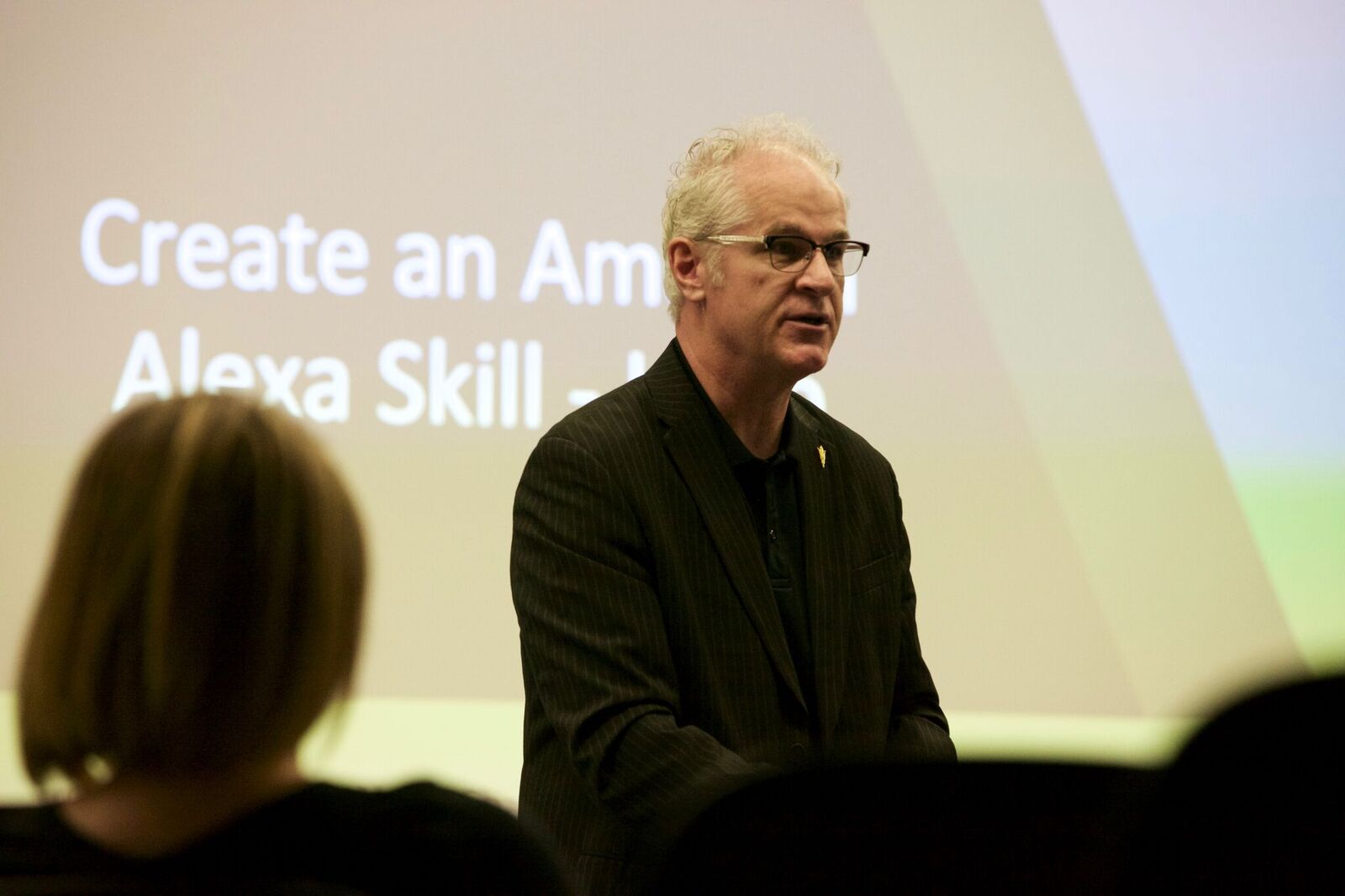“Alexa, show me the way to Lake Havasu.”
That voice-activated command became a reality on Friday when a group of students in Arizona State University's Ira A. Fulton Schools of Engineering and a coterie of University Technology Office staff headed west to ASU at Lake Havasu to help incoming students learn and develop voice-activated “skills” for the Amazon Echo Dot.
The visit was a follow-up to a recent university-sponsored gifting of Echo Dots to approximately 200 students, faculty and some staff at the Havasu location the week prior.
“It’s like giving them a tool without the instructions,” said John Rome, ASU’s deputy chief information officer, after the distribution of the Echo Dots to the entire Havasu student body on Sept. 14. “After today's training sessions, the students, faculty, staff and community members attending are now better prepared to start building engaging voice apps or 'skills.' It was great to see all the excitement in the room and around campus about the Lake Havasu voice program."

ASU Deputy Chief Information Officer John Rome leads an information session at ASU at Lake Havasu Friday on how to build voice-activated skills using an Amazon Echo Dot. Photo courtesy of ASU at Lake Havasu
In August 2017, 1,500 engineering students living at Tooker House on ASU’s Tempe campus received Echo Dots and became part of the first-of-its-kind voice-enabled, learning-enhanced residential community in the country.
The program expanded this fall to include ASU Havasu so that students outside of Tempe can use voice activation and artificial intelligence in their day-to-day lives and stay connected to the entire university.
“ASU at Lake Havasu aims to develop an innovative techno-sphere to support the development of practical ways of using AI voice-programming to enhance campus information distribution and classroom pedagogy,” said Raymond Van der Riet, director of ASU at Lake Havasu. “We see a wide-ranging number of applications on the horizon for AI and believe that, if we harness our academic community in creative ways, we will be able to bring that future into sharper focus. Havasu wants to be part of that debate.”
On Friday there wasn’t much debate going on in the two instructional sessions held at Santiago Hall. Students learned how to connect these devices the size of a hockey puck to the ASU network and how to use and program them. Many were amazed at how easy it was to build a voice “skill," and in some cases, with little or no programming experience.
"I'm not a very technologically savvy person, but even I was surprised at how easy it was to learn the skills," said Abbie Anderson, a 23-year-old communications major. "I'm very excited to try it."
Anderson said she will attempt to load Alexa with quizzes so that she and her friends can use it to study for upcoming tests and exams.
Dolores Baca, a 22-year-old criminal justice major and community assistant at Lake Havasu Hall, said she could envision utilizing Alexa for a specific use.
"I found the information session beneficial, and I could see building skills for Alexa to remind fellow residence hall members what's going on and keeping them informed," Baca said.
The visiting team also shared with the audience the official ASU Alexa skill where student could find information about ASU, even about the Lake Havasu campus — answering queries such as, “Alexa, ask My ASU, what are the hours of the Lake Havasu Learning Center?” or “Alexa, tell me about the London Bridge?”
The two instructional sessions were led in part by ASU engineering student Carter Kwon, who is also a management intern within ASU’s UTO office.
“ASU is a leader in voice technology, and it has the potential to get many people engaged at the university,” Kwon said. “That in and of itself is powerful because it connects ASU students on the Tempe, Polytech, West and Havasu campuses.”
Kwon said it’s also useful to learn the voice-enabled technology on a professional level.
“Having experience with voice is a very marketable skill right now,” Kwon said. “There are a lot of products on the market that reads on the box ‘voice-enabled.’ Well, somebody has to develop all of that, and we are very much in the early stages of this technology.”
That bit of wisdom resonates with Havasu student Cortez Fields, who could see adopting these skills at his future place workplace when he graduates in May.
"Alexa is an open-source platform and has endless potential as far as what we can do with it," said Fields, who is a business communications major. "From a business perspective, if Alexa were to be coded correctly, it could make for an excellent communication tool in an organization. That is something worth thinking about."
Top photo: An Echo Dot with an ASU at Lake Havasu wrap. Photo courtesy of ASU at Lake Havasu
More Science and technology

Google grant creates AI research paths for underserved students
Top tech companies like Google say they are eager to encourage women and members of historically underrepresented groups to consider careers in computer science research.The dawn of the era of…

Cracking the code of online computer science clubs
Experts believe that involvement in college clubs and organizations increases student retention and helps learners build valuable social relationships. There are tons of such clubs on ASU's campuses…
Consortium for Science, Policy & Outcomes celebrates 25 years
For Arizona State University's Consortium for Science, Policy & Outcomes (CSPO), recognizing the past is just as important as designing the future. The consortium marked 25 years in Washington, D…


